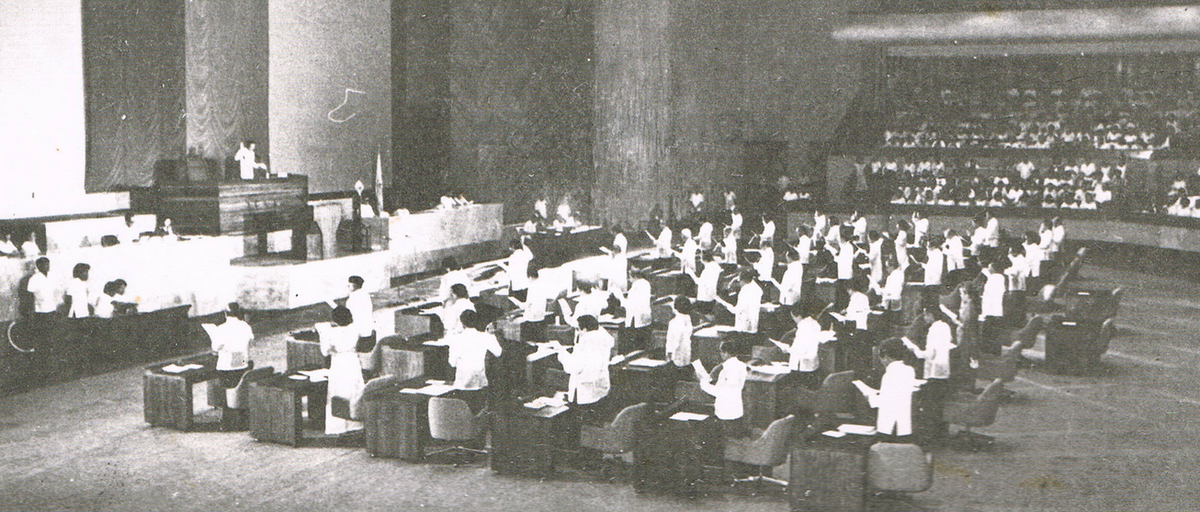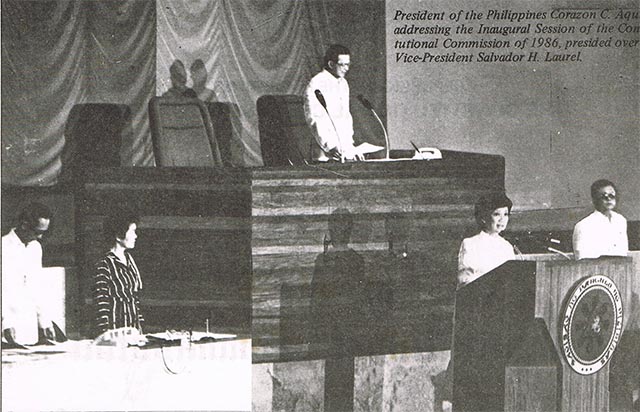 The Preamble of the 1987 Constitution goes like this: "We, the sovereign Filipino people, imploring the aid of Almighty God, in order to build a just and humane society, and establish a Government that shall embody our ideals and aspirations, promote the common good, conserve and develop our patrimony, and secure to ourselves and our posterity, the blessings of independence and democracy under the rule of law and a regime of truth, justice, freedom, love, equality, and peace, do ordain and promulgate this Constitution."
The Preamble of the 1987 Constitution goes like this: "We, the sovereign Filipino people, imploring the aid of Almighty God, in order to build a just and humane society, and establish a Government that shall embody our ideals and aspirations, promote the common good, conserve and develop our patrimony, and secure to ourselves and our posterity, the blessings of independence and democracy under the rule of law and a regime of truth, justice, freedom, love, equality, and peace, do ordain and promulgate this Constitution."This is a 75-word introduction to the Constitution. Yes, it's a sentence, not a paragraph. The things that make it longer are the intervening words. Removing them, we end up with, "We, the sovereign Filipino people, do ordain and promulgate this Constitution."
Many of us are familiar with this sentence, the Preamble, because we studied it in college under the Philippine Government and Politics course. Although not all of us have succeeded in memorizing it, we are at least aware that it exists and aware of certain phrases it contains.
Compared with the US Constitution's Preamble, ours is longer and more poetic. This is probably because of the experiences that drafters had before restructuring the government in 1986. Some people think that our Preamble and our Constitution are exaggerated but others insist that it is one of the best constitutions of the world.

An important question that must be answered is whether the Preamble is an important part of the Constitution. The answer is in the negative. No, it is not an important part of the fundamental law. In fact, it is neither a source of right nor a source of obligation. It creates no office and confers no privilege. Otherwise put, it is legally unimportant unless and until an ambiguity in the Constitution needs to be clarified by the courts. In this case, resort to the Preamble is justified by the basic principles of legal hermeneutics or statutory construction. The Preamble can help make clear whatever uncertainty, vagueness or obscurity confronts the court in applying the law.
That the Preamble is not an essential part of the Constitution does not mean that it is not a rich source of discussion in constitutional law. Let's start with the first few words.
"We, the sovereign Filipino people..." This part clarifies that the Filipino people are the sovereign. Sovereignty is the right and power to impose obedience; it is the right and power to rule. In other jurisdictions, the sovereign may be a person or a thing just like the Pope or the Crown. In the Philippines, it is the people themselves who wield the ultimate power to make rules and execute them.
Because of this, I remember a funny story that happened in my second year in the university. I was in a class on social dimensions when the discussion took a turn to the topic of government. The professor asked what "sovereignty" is and most students got it correctly. However, one of my classmates, asked who the sovereign is in the Philippines, answered that they are the lawmakers. I raised my hand and argued against this absurd idea. She countered that, since lawmakers are the ones making rules, they are the sovereign. The professor did not bother to correct her.
That classmate of mine forgot the fundamental principles of Philippine governance: "republicanism." All legal authority emanates from the people and they merely elect representatives who act on their behalf.

Moving on to the next part, "imploring the aid of Almighty God." This part of the Preamble has been cited many a time in online fora. The religious insist that the Constitution is a Christian, or at least a religious, document. Opponents of this idea, of course, argue that it is not, citing the separation clause, the non-establishment clause and the free exercise clause. The opponents of course are correct. As earlier mentioned, the Preamble is not an important part of the Constitution. It is merely an expression of the sentiment of the people drafting it. If anything else, this part simply reflects the reality that Filipinos, at least most of them, are a highly-religious people.
Finally, let's go to that part, "in order to build a just and humane society, and establish a Government that shall embody our ideals and aspirations, promote the common good, conserve and develop our patrimony, and secure to ourselves and our posterity, the blessings of independence and democracy under the rule of law and a regime of truth, justice, freedom, love, equality, and peace..." Again, this part echoes the reality that the people are the sovereign and that the government merely represents the people.
This portion of the Preamble elucidates that the people established the government for certain purposes therein mentioned. If the people in government cannot provide these to the people, they fail as representatives.
"Common good" is mentioned, instead of "general welfare," a phrase that focuses more on the number rather than on the welfare. "Patrimony" and "posterity" were included to emphasize the obligation of the government to make sure that the freedoms and rights of the people should be enjoyed by this generation, the next and those to come. "Rule of law" was mixed with "truth, justice, freedom, love, equality, and peace" in order to express the distaste of the framers of the previous government under the 1973 Constitution and what that powers that be did during their regime.
